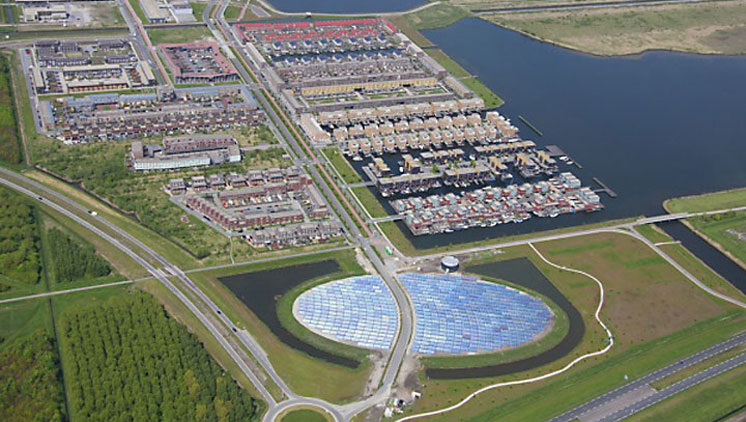Thermaflex District Energy project – Almere District Heating Network, NL (Case Study)
Why the DES (District Energy Systems) Initiative?
Accelerating the uptake of energy efficiency and renewable energy in the global energy mix is the single biggest contribution to keep global temperature rise under 2 degrees Celsius (°C) and to reap the multiple benefits of an inclusive green economy.
Cities account for over 70 percent of global energy use and, 40 to 50 percent of greenhouse gas emissions worldwide. In several cities, heating and cooling can account for up to half of local energy consumption. One of the least-cost and most efficient solutions in reducing emissions and primary energy demand is the development of modern (climate-resilient and low-carbon) district energy in cities.
To facilitate this energy transition, the United Nations Environment Programme launched the Global District Energy in Cities Initiative at the New York Climate Summit in September 2014, as the implementing mechanism for the Sustainable Energy for All (SE4ALL) District Energy Accelerator.
District energy is an approach to applying technologies to co-ordinate the production and supply of heat, cool, domestic hot water and power to optimise energy efficiency and local resource use.
The Global District Energy in Cities Initiative is supporting national and municipal governments in their efforts to develop, retrofit or scale up district energy systems, with backing from international and financial partners and the private sector. Twinning between cities – matching champion ones with learned ones is a key component of the Global District Energy in Cities Initiative to scale up lessons learned and best practices.
To facilitate this energy transition, UNEP has created a new initiative on District Energy in Cities, as the implementing mechanism for the SE4ALL District Energy Accelerator. The Initiative has partnered with leading private sector entities, as well as industry associations that commit to contributing technical expertise to the Initiative’s activities.
PBPSA member Thermaflex is proud to be a UNEP private sector partner contributing to the global initiative UNEP DES implementing the SE4ALL District Energy Accelerator.
UNEP programme website: www.districtenergyinitiative.org/
City networks such as ICLEI and C40 help the Initiative connect with cities globally and the Initiative also receives significant support from intergovernmental and government organisations such as UN-Habitat, the International Finance Corporation (IFC) and the Global Environment Facility (GEF).
" This initiative is aligned with London's thinking and approach of removing barriers to mobilize public and private investment and expertise in modern district energy in order to cost-effectively achieve multiple policy objectives including our carbon targets.…. we transformed £3 million of funding from the EU into £25 million of investment in district heating in just 3-4 years with £150 million of projects under development.“
– Peter North, Greater London Authority (2015)

What are District Energy Systems (DES)?
District Energy is about local production matched to local use – and not only at a building level, but also at the neighbourhood and city level.
Modern district energy systems combine district heating, district cooling with combined heat and power, thermal storage, heat pumps and/or decentralised energy. They are increasingly climate resilient and low carbon, allowing the:
- Recovery and distribution of surplus and low-grade heat and cold to end-users (e.g., previously unused waste heat from industry or power stations, waste water and use of natural water reserves such as lakes, rivers);
- Storage of large amounts of energy – such as surplus wind power or surplus heat in the summer – at the lowest cost compared to other energy storage options;
-
Integration and balancing of a large share of variable renewable power
– for example, through conversion to heat and stored for use seasonally or during peak thermal demand.
As stated by UNEP in its programme notes: "It is time for a redefinition of District Energy. It is no longer exclusively about heat or surplus energy, the traditional drivers of district energy. It's about local production matched to local use – and not only at a building level, but also at the neighbourhood and city level. It's about sharing energy between buildings. And it's about resource efficient neighbourhoods and resilient cities. District energy is an approach to applying technologies to co-ordinate the production and supply of heat, cool, domestic hot water and power to optimise energy efficiency and local resource use."
PBPSA member Thermaflex is a leading supplier of piping systems made from Polybutene-1 which incorporate the latest insulation technologies, and form the fundamental building elements of district energy systems for cities and localities.
DES Initiative Programme Actions
1. Outreach
Awareness-raising on the opportunities of district energy is crucial to raising public and investor confidence and interest, thereby lowering perceived risk, improving the bankability of projects and facilitating effective policy implementation.
2. Light Touch Assessments and Technical Assistance
Political decision makers may not know the energy demand for heating (which can be mixed with hot water, power and cooking) or cooling from air conditioning and electric chillers (which is hidden in a building’s total electricity bill). The Initiative will work with signed-up cities to identify the potential and benefits of district energy through a DES Rapid Assessment.
3. Deep Dive District Energy Demonstrations and City-wide Plans
The DES Initiative will provide ‘deep-dive’ support to a limited pilot cities across geographically diverse countries through direct staffing and coordination support from the DES Initiative. The objective of this ‘deep-dive’ support will be to demonstrate the costs and benefits of applying a DES approach in each city and to test and adapt policy best practice to each country/regional context.
4. Tools and training
The Initiative will also focus on collecting and disseminating best practice and project results from the ‘light touch’ and ‘deep dive’ activities of the Initiative, and will ensure that learning cities signing up to the DES Initiative are sufficiently supported to develop DES, through a Virtual Platform of tools, methodologies, best practices, training webinars, publications and fundraising-matchmaking webinars. This will ensure that the DES Initiative’s methodology for establishing DES in a city is scaled up and national and global replication is achieved.
UNEP flagship publication: District Energy in Cities
One of the first activities of the Initiative was the publication of best practice guidance for cities and national governments to overcome these barriers through four chapters on technology, local policy, business models and national policies and regulations, and a fifth chapter describing a methodology for cities to develop modern district energy. This United Nations Environment Program (UNEP) flagship publication is entitled ‘District Energy in Cities. Unlocking the Potential of Energy Efficiency and Renewables’ and was launched in February 2015.
UNEP Publication download
Initiative partners to date
The Sustainable Energy for All (SE4ALL) global initiative is coordinated by UNEP (United Nations Environmental Programme). PBPSA member Thermaflex, a leading global innovator of piping systems for District Energy is one of the active private sector members of the initiative.
Private Sector:
Danfoss, Grundfos, Siemens, Vattenfall, Veolia, Empower, Climespace, Dalkia, ENGIE, Compagnie Parisienne de Chauffage Urbain (CPCU), Sustainability Solutions Group, GGLO, Thermaflex, King & Spalding.
Industry Associations:
International District Energy Association (IDEA), Euroheat and Power (EHP), Global Wind Energy Council (GWEC), World Wind Energy Association (WWEA), World Bioenergy Association (WBA), International Geothermal Association (IGA), CLEAN Cluster.
International Organizations:
UNEP, UN-Habitat, International Energy Agency (IEA), Copenhagen Centre on Energy Efficiency (C2E2), International Finance Corporation (IFC), Climate Technology Centre and Network (CTCN) and the Global Environment Facility (GEF).
Networks:
ICLEI -Local Governments for Sustainability and C40 Cities Climate Leadership Group.
Municipal Governments:
Anshan (Liaoning Province, China), Banja Luka (Bosnia & Herzegovina), Belgrade (Serbia), Betim (Brazil), Bogotá (Colombia), Boston (USA), Focsani (Romania), Helsinki(Finland), Jeju (South Korea), Jinan (Shandong province, China), London(UK), Milano (Italy), Nairobi (Kenya), Paris (France), Quito (Ecuador), Rajkot (India), Recife (Brazil), San Jose (Costa Rica), Santiago de Cali (Colombia), Sarajevo (Bosnia & Herzegovina), Seoul (South Korea), Sorocaba (Brazil), St. Paul (USA), Tokyo (Japan), Vancouver (Canada), Vaxjo (Sweden), Velenje (Slovenia) and Warsaw (Poland).
National partners:
US Department of Energy, Croatia, DANIDA (Denmark), ADEME (France).
Article content adapted from UNEP sources
. . . . . . . . .
Polybutene-1 is often referred to as Polybutene, Polybutylene, PB-1 or PB.
Polybutene-1 is not sold by PBPSA members for use in pipe applications intended for use in North America, and those parties require their customers or distributors not to sell products made from PB-1 into pipe applications for North America.




